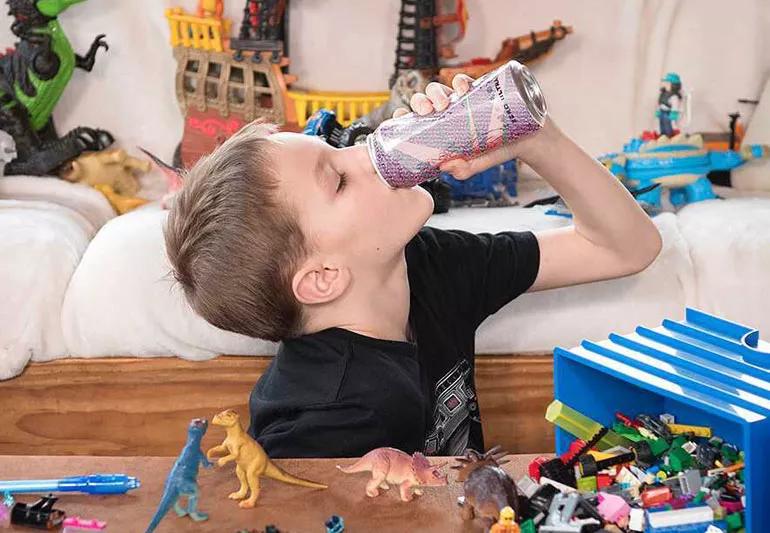Why kids and caffeine just don’t mix

Image content: This image is available to view online.
View image online (https://assets.clevelandclinic.org/transform/45b5ca87-b15d-4c93-ac88-d09ae74cc2f1/preteenEnergyDrink-032121-MK-770x533-1_jpg)
preteen drinks and energy drink while playing
With their neon colors and flashy designs, energy drinks are oh-so-tempting to young eyes. So, when your tween is begging for a bottle of one and you’re tired of arguing, would it be the worst idea to cave and let them have one?
Advertisement
Cleveland Clinic is a non-profit academic medical center. Advertising on our site helps support our mission. We do not endorse non-Cleveland Clinic products or services. Policy
Pediatric dietitian Diana Schnee, MS, RD, CSP, LD says it’s best to steer clear. “These drinks are marketed in a way that’s really appealing,” Schnee says. “But they can be harmful to kids.”
Schnee explains why energy drinks and kids don’t mix.
The U.S. Food and Drug Administration (FDA) doesn’t have official guidelines about kids and caffeine. But pediatric experts say kids under the age of 12 should avoid caffeine, and those over 12 should limit it to no more than 100 milligrams (about two cans of cola) per day.
If your kids sometimes drink caffeinated soda or enjoy an iced latte at the coffee shop, you might think that energy drinks aren’t much different. Think again.
The American Academy of Pediatrics says that energy drinks should be totally off-limits to kids and adolescents.
A cup of cola contains about 45 milligrams of caffeine, while a cup of coffee has about twice that. Energy drinks vary widely, depending on the brand and the size of the can or bottle. But some can pack a punch of 400 milligrams or even 500 milligrams of caffeine per container. That’s a lot.
Plus, the FDA doesn’t regulate the amount of caffeine in beverages, Schnee says, so you can’t always trust what you see on the label. “A can might say it contains 200 milligrams but actually has 250. There’s no regulation.”
Advertisement
Here’s something else that parents might not be aware of. Many energy drinks contain a variety of stimulants besides caffeine, including herbal supplements or other natural stimulants from plants. That all adds up to a serious case of bouncing off the walls.
What’s the harm in a little energy boost? Energy drinks do more than make kids hyper. High amounts of caffeine can cause uncomfortable side effects and even harm a child’s health.
These problems include:
“Regularly consuming energy drinks puts the body in an elevated state of stress,” Schnee says. “Over time, that can affect children’s developing brains and cardiovascular systems.”
What age can you safely have energy drinks? Schnee says there’s no age at which she’d say energy drinks are A-OK. “I wouldn’t even recommend that adults drink them.”
Caffeine is also addictive, especially when you’re regularly consuming high doses. “Caffeine might be legal, but it’s still a drug,” Schnee says.
Kids who drink a lot of caffeine and then quit can experience withdrawal symptoms, including:
How do you handle a kid who really wants to drink the stuff in the cool can? “Sit down and talk to them about it,” Schnee suggests. “Ask why they want it. Is it because their friends are drinking it? Or do they feel like they have low energy?”
If they complain of feeling sluggish, you can work together to find natural ways to give them a boost. Schnee suggests starting with the basics:
“Rather than just putting a caffeinated bandage on the problem, look for ways to give them a jump-start,” she says.
Many kids are simply tempted by the colors and flavors of energy drinks. So help them find alternative beverages. True, caffeine-free soda is an option, but there are healthier choices that aren’t full of sugar.
Schnee suggests these sugar-free, caffeine-free alternatives:
Bottom line? Like buying your kids a pony or letting them have ice cream for every meal, put energy drinks on your “not gonna happen” list. End of discussion. “There are better ways to get energy,” Schnee says.
Advertisement
Advertisement

Delivered every Tuesday!
Sign up for our Health Essentials emails for expert guidance on nutrition, fitness, sleep, skin care and more
It's a letter about the news!
Learn more about our editorial process.
Advertisement
No amount of caffeine is safe for kids under 12, and kids 12 to 17 should be cautious about how much they consume
Depending on your sensitivity to caffeine, a late-night cup may be just fine
Don’t make the mistake of stopping cold turkey
These caffeine-packed supplements can give your workouts a boost
You don’t need coffee or caffeine to get by
Yes, there is such a thing as too much coffee
Learn the risks and rewards of your daily caffeine intake
They're not a safe way to stay awake
Type 2 diabetes isn’t inevitable with these dietary changes
Applying a hot or cold compress can help with pain
Pump up your iron intake with foods like tuna, tofu and turkey